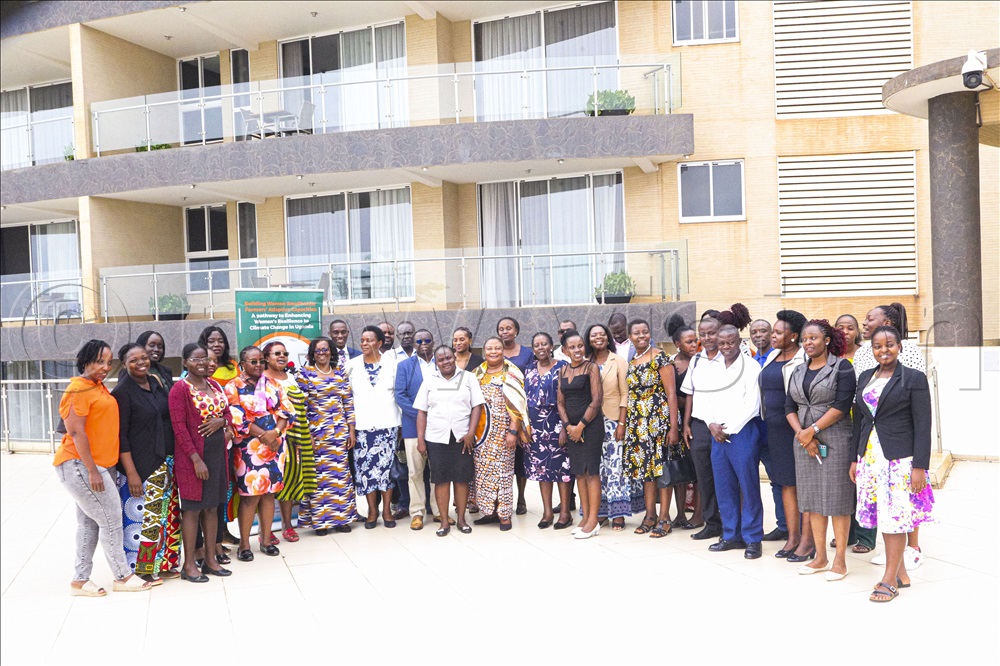By Ritah Mukasa
Women smallholder farmers in rural areas face several gender-based constraints that exacerbate their vulnerability to climate change shocks.
It’s against this background that for several months, a research team from the School of Women and Gender Studies at Makerere University has been engaging over 1,500 smallholder farmers in Lyantonde and Katakwi districts through the Women Smallholder Farmers’ Empowerment and Resilience (WOSFER) project.
The team includes; Prof. Florence Kyoheirwe Muhanguzi, Dr. Brenda Boonabaana, Dr. Suzan Kavuma, Dr. Catherine Mulinde Kafeero, Adeline Rwashana Muheebwa and Dr. Joab Ezra Agaba.
They were in partnership with; the International Development Research Center (IDRC) and Foreign, Commonwealth and Development Office (FCDO) plus the Association of Uganda Professional Women in Agriculture and Environment (AUPWAE).
They seek to strengthen the empowerment and adaptive capacity of women smallholder farmers in the cattle corridor of Uganda together with their spouses.

But first, they went on the ground in those two sample districts to establish the different issues affecting women smallholder farmers before designing sustainable interventions.
On Friday, July 19, the team presented its findings to different stakeholders who convened at Skyz Protea hotel in Kampala and the event was officiated by the minister of state for gender and culture, Hon. Dr. Peace Mutuuzo.
Prof. Kyoheirwe pointed out the low levels of empowerment for both men and women in the two districts.
She says they found that only 26% of the women are empowered compared to 46% of the men.
The contributors include; poor work balance, low self-efficacy and gender-based violence. Also, women lack autonomy in decision-making and ownership of key assets.
On the other hand, smallholder farmers have low levels of resilience and majority cannot bounce back after a shock. Also, they can barely make proactive and informed decisions, in terms of adapting to climate change shocks.
What’s more; there is limited access to weather and agricultural advisories. Of the 1,500 beneficiaries they engaged, only 17 women have accessed those services in Katakwi and in Lyantonde it’s 27, despite having agricultural officers.
“We realized that little is being done on the ground partly because the population is big and the agricultural officers are few,” she says adding; “Besides, some women prefer female officers to men because their husbands’ don’t want them to associate with male strangers.”
Relatedly, the team did not find any farmer on insurance. In fact, majority, mostly women had no idea what insurance is and the few who heard about it were biased.
In her remarks, Hon. Mutuuzo highlighted the crucial role of women, being primary producers of food, livestock, and cash crops which are essential for household food security and nutrition. Therefore, enhancing the adaptive capacities of women smallholder farmers is imperative for sustainable development.
Also, amidst escalating climate change impacts, Mutuuzo says, building adaptive capacities is critical. It mitigates extreme weather effects on communities, preserves essential ecosystems, and safeguards vulnerable livelihoods. Tailored interventions and sustainable practices are essential for long-term sustainability.
“The baseline survey findings are a milestone in the national efforts to advance women’s socio-economic empowerment,” she noted.
Mutuuzo thanked Makerere University for its move to build national and local capacities for climate change mitigation, adaptation and management through research.
LEAD PHOTO CAPTION: Prof. Florence Kyoheirwe Muhanguzi presenting their findings on Friday, July 19 at at Skyz Protea hotel in Kampala.





